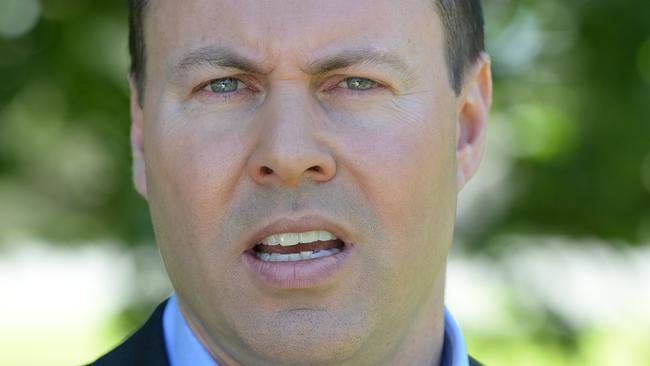Frydenberg says small electric cars pollute less
Josh Frydenberg has rejected findings that electric vehicles have a bigger carbon footprint than conventional cars.

Energy Minister Josh Frydenberg has rejected findings that electric vehicles charged on the national electricity grid have a bigger carbon footprint than conventional cars, staring down backbench critics of the electric car industry.
Mr Frydenberg yesterday reiterated his view that the number of electric cars in Australia would jump from 4000 to one million by 2030, and said the government would continue to support this “very exciting sector”.
The minister has come under fire from colleagues who say promoting electric cars in Australia, with its heavy reliance on coal-fired power, won’t help the nation meet its Paris emissions targets.
Liberal MP Craig Kelly, backed by Nationals MPs Andrew Broad and John Williams, said they would raise the matter in the Coalition partyroom, arguing that there should be no further support given to the sector.
A report for the Department of Infrastructure and Regional Development in 2016 found that the high reliance on coal-fired power in Victoria, NSW and Queensland meant electric vehicles charged on the grid in those states “have a higher CO2 output than those emitted from the tailpipes of comparative petrol cars”.
Mr Frydenberg identified several micro-sized electric vehicles that he said had smaller carbon footprints than comparable internal combustion vehicles.
“When taking into account the current average emissions of the national electricity grid, the Nissan Leaf and the Renault Zoe already produce less emissions per kilometre travelled when compared to an equivalent size vehicle,” he told The Australian.
“The emissions profile of EVs will decline as the grid becomes less emissions-intensive in the years ahead.”
The minister said the predicted surge in electric vehicles on the road would increase electricity demand by 2 per cent by 2030, which the Finkel review into energy security found could be “relatively easily managed”.
Resources industry sources said this was equivalent to new energy demand on the system of about half the output capacity of a coal-fired power station.
However, the Australian Energy Market Operator said this was “moderate” compared to the impact of rooftop solar and energy-efficiency initiatives.
Mr Frydenberg welcomed reports that British billionaire Sanjeev Gupta was seeking to buy some of Holden’s assets at its shuttered Adelaide factory with a view to building electric vehicles on the site. Mr Gupta has declined to comment on his plans, but the owner of the site said it welcomed the proposal.
The Electric Vehicle Council has called for subsidies of up to $7000 to encourage sales, including tax exemptions and the axing of stamp duty and registration charges by the states.
Mr Frydenberg has not ruled out such support, but yesterday said he was focused on ensuring sufficient charging stations were available to support the growing numbers of electric vehicles.
“When people come to make a decision about the vehicle they purchase, they want to make sure that if they do purchase an electric vehicle that they can plug it in when they go on a long road trip and the infrastructure is consistent throughout the country,” he said. “So there are some logistical issues that we will co-operate closely with state and local governments on.”
Opposition finance spokesman Jim Chalmers said Labor wanted more electric vehicles.
Additional reporting: Greg Brown






To join the conversation, please log in. Don't have an account? Register
Join the conversation, you are commenting as Logout